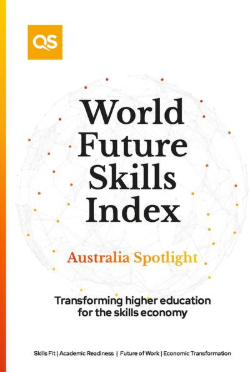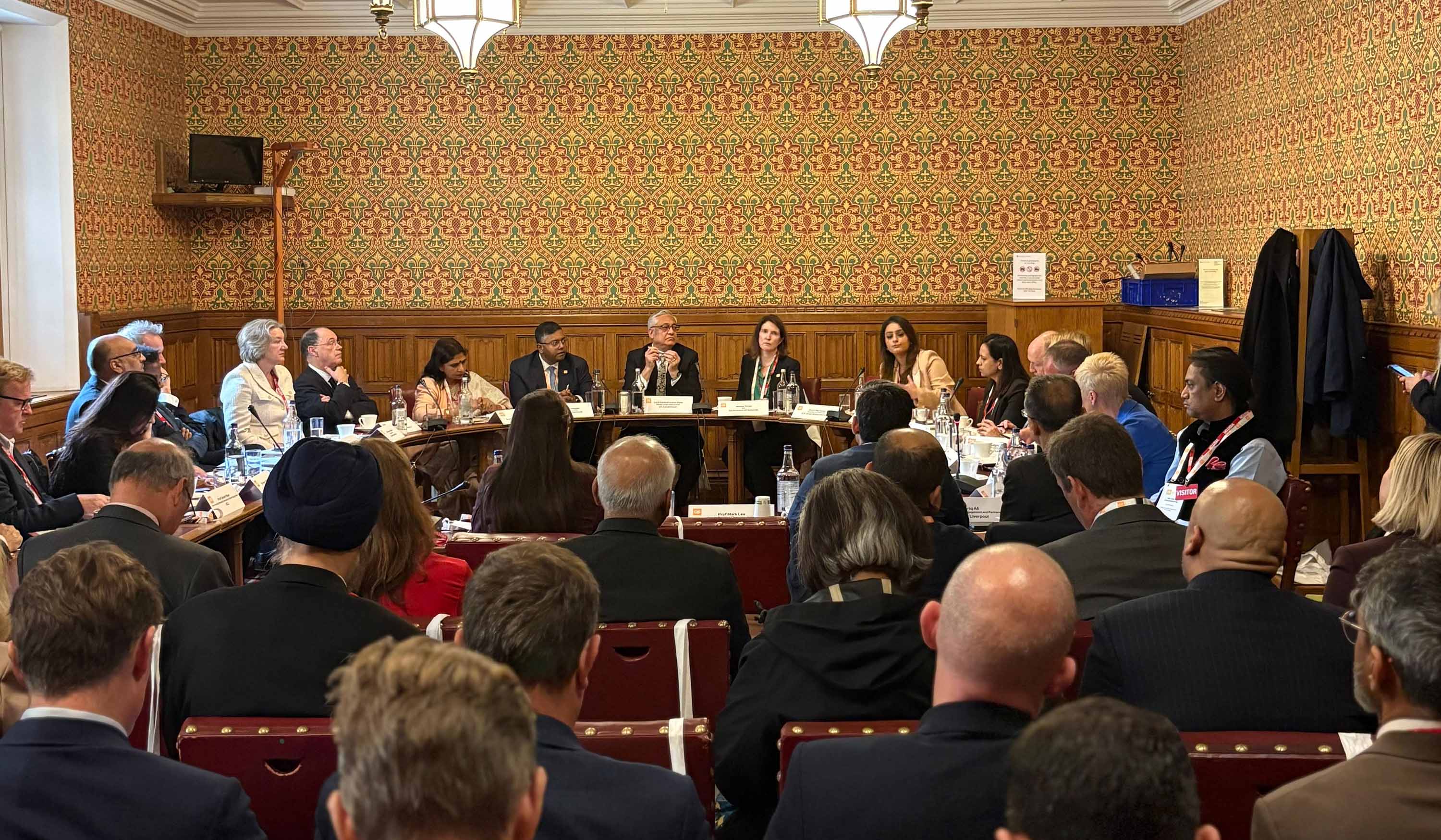Welcome to the Australia Spotlight on the QS World Future Skills Index, where we explore higher education’s critical role in shaping the workforce of tomorrow. This tailored resource empowers you to analyse Australia’s future skills supply and demand, benchmark key industry jobs and skills gaps against over 80 countries, and align your higher education system with the skills training required for economic transformation.
Welcome to the Australia Spotlight on the QS World Future Skills Index, where we explore higher education’s critical role in shaping the workforce of tomorrow. This tailored resource empowers you to analyse Australia’s future skills supply and demand, benchmark key industry jobs and skills gaps against over 80 countries, and align your higher education system with the skills training required for economic transformation.
Australia performance overview
Australia performs strongly in the QS World Future Skills Index, with a score of 93.3. Only Germany, the US, and the UK have a higher overall score. Australia is part of the Rapid Industry Innovation Cluster, where strong demand for future skills outpaces supply. With higher education playing a key role, Australia excels in producing skilled graduates, particularly in AI, Digital, and Green sectors. Australian employers have among the highest demand for green skills among their employees, and Australian universities perform well in green subject areas. However, addressing gaps between skills supply and industry demand remains critical. Strengthened collaboration between government, universities, and industries will be essential to fostering innovation and ensuring workforce adaptability. Continued investment in education and R&D will solidify Australia’s global competitiveness and economic resilience.
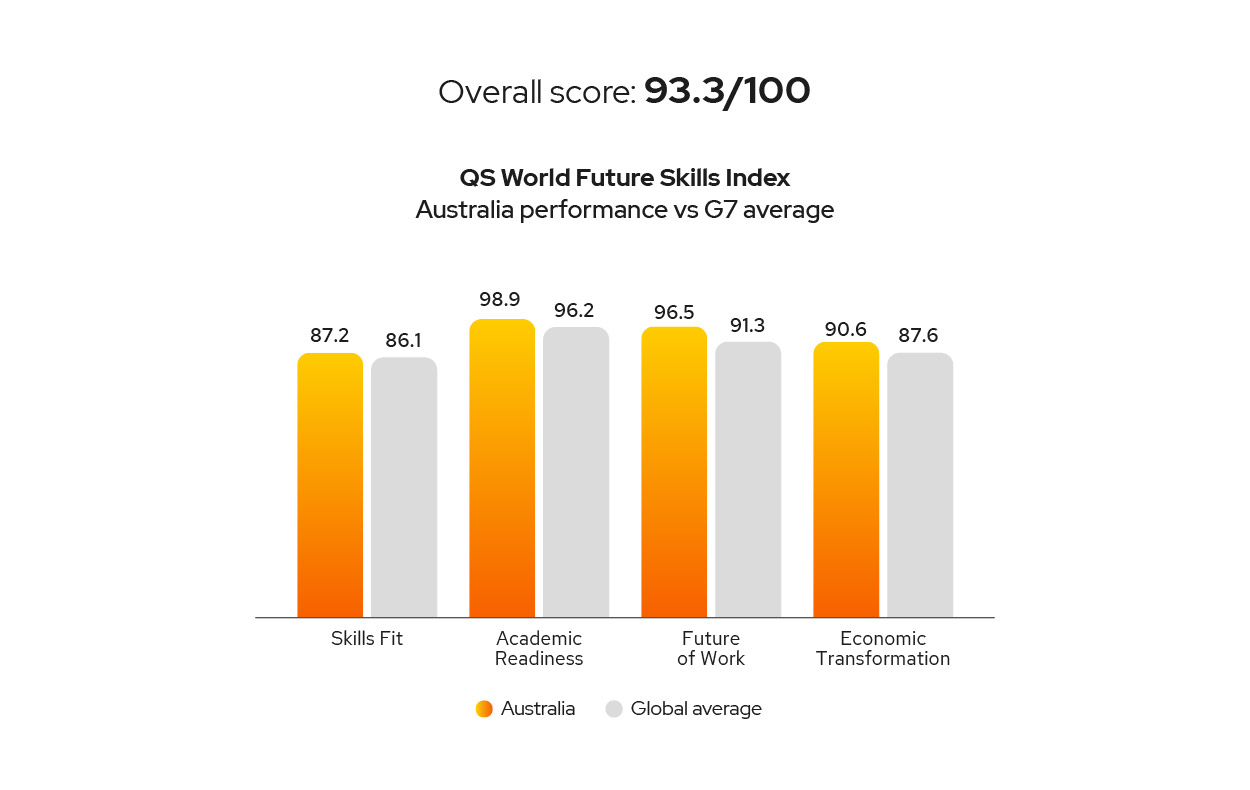
About the indicators
Skills Fit
The Skills Fit indicator measures how well countries are equipping graduates with the skills that employers desire. This is assessed by determining the gap between what employers find important and their level of satisfaction with the skills provided by graduates. This is done using data from the QS Global Employer Survey, the largest of its kind, and data from the World Bank Group. Since 2021, over 100,000 employers have rated the importance of certain skills and their satisfaction in their graduate hires.
Future of Work
The Future of Work indicator evaluates a country’s readiness to recruit for the skills needed in the jobs of tomorrow. Specifically, it measures how well the job market is prepared to meet the growing demand for digital, AI, and green skills, all of which are becoming critical as economies transition towards technology-driven and sustainable industries.
Academic Readiness
This dimension measures how well a country is prepared for the future of work. We look at the number of universities assessed for the QS World University Rankings by Subject, and how they perform. We then measure this in tandem with population size – if a country has a large population but few well-ranked institutions, for example, the country will be penalised.
Economic Transformation
Economic Transformation uses a weighted formula to assess a country’s readiness to support the growth and future of work and skills by examining various key indicators. The Index highlights whether a country has the infrastructure, investment power, and talent available to transition to industries driven by AI, digital transformation, green technologies, and high-skilled work, using data from the World Bank Group, UNESCO Institute for Statistics and the Education Policy Institute
Australia performance in detail
Skills Fit
Australia outperforms the G7 overall, and particularly in Entrepeneurial and Innovative Mindset underscoring the nation’s ability to produce adaptable, innovative professionals. However, across the other three sub-indicators we see skills gaps, particularly in Human-centred Leadership and Sustainable and Ethical Workforce. To address this, universities must integrate these skills into curricula, while fostering deeper partnerships with industries to drive alignment between education and workforce demands. For Australia to sustain its excellent Skills Fit score, graduates must be ready to meet future challenges.
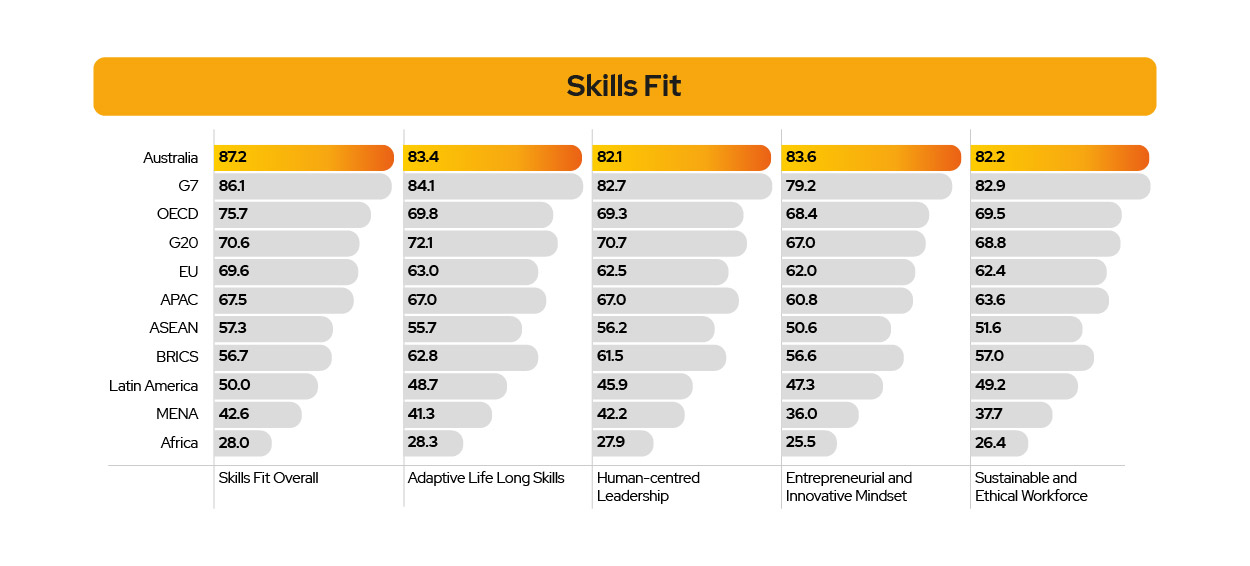
Future of Work
Australia is well-positioned for the future of work, with high demand for AI (92.3), Digital (94.5), and Green (95.6) skills. These strengths indicate a forward-thinking and innovative job market in Australia. Green skills are in particularly high demand in Australia, further emphasising the country’s green credentials. However, rapid advancements require ongoing investments in upskilling and reskilling. By fostering stronger collaboration between universities, industries, and government, Australia can ensure its workforce remains competitive, adaptable, and globally relevant.
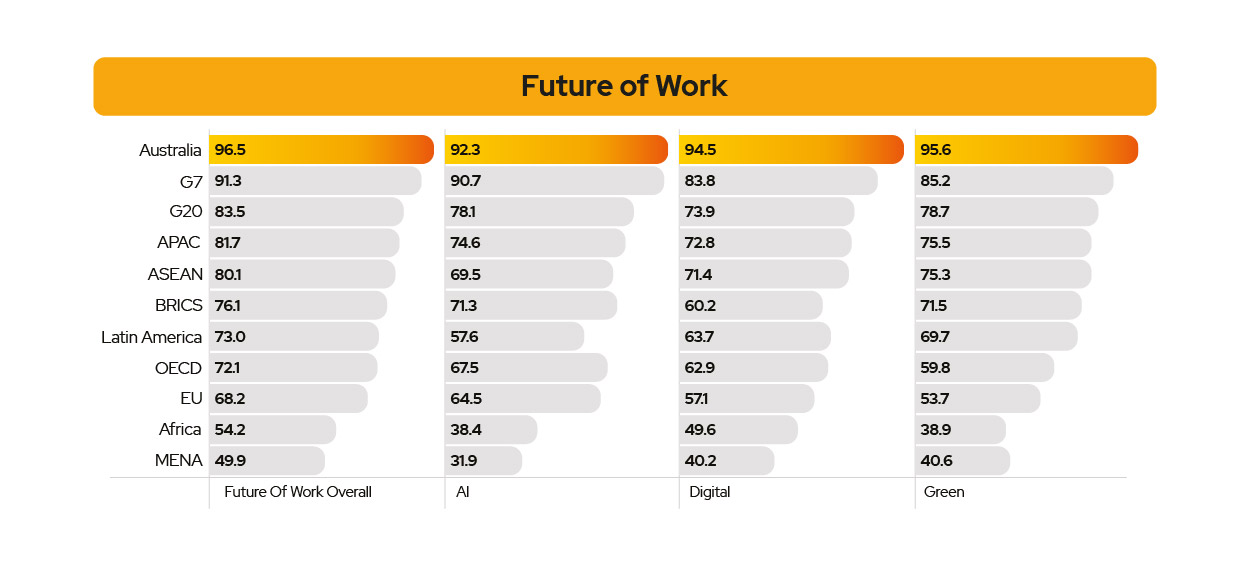
Academic Readiness
Australia excels in Academic Readiness, achieving exceptional scores in AI (98.6), Digital (98.4), and Green (98.2) subjects. With 36 universities ranked in the QS World University Rankings by Subject 2024, it truly is a global leader. This is especially evident in green subjects - only the Netherlands and Hong Kong are ahead in terms of their academic excellence in green subject areas. To sustain its position, Australia must integrate sustainability, interdisciplinary approaches, and innovation across curricula.
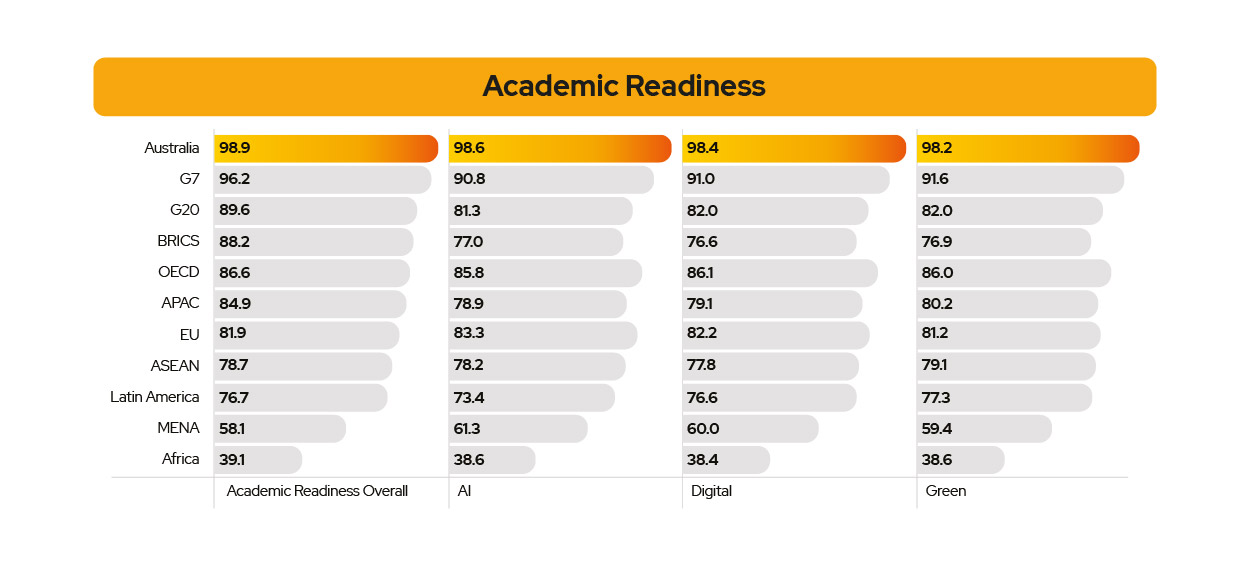
Economic Transformation
The Australian economy’s growth is stalling, as seen in its low Economic Capacity score, but Australia’s higher education sector is an opportunity to drive economic transformation and growth. With high demand for green skills and clear talent for teaching green subjects at Australian universities, increasing green-related R&D investment should be a priority for the Australian government. This investment would utilise Australian higher education’s strengths, drive research innovation and economic growth, and reaffirm Australia’s position as a green leader.
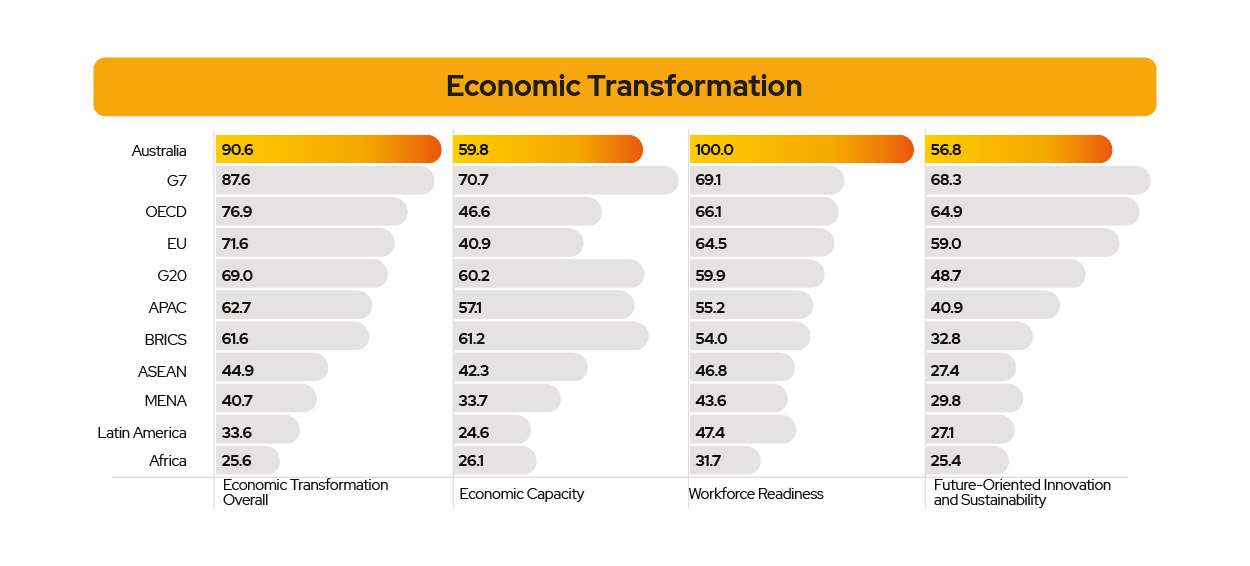
Conclusion and analysis
Australia is the world’s 13th largest economy by nominal GDP according to the World Bank Group. Its universities offer a high volume of world-class AI, digital and green related subjects, as indicated by its near-perfect Academic Readiness score.However, while the International Monetary Fund projects Australia’s economic growth to increase to 2.1% in 2025, other Economic Capacity sub-indicators highlight a risk. Skills readiness requires continued investment, and Australia falls behind G7 and APAC peers in our economic metrics..There is high demand for AI, digital and green skills by Australian employers, but a Skills Fit score of 87.2 shows a misalignment between employer needs and the skills Australian students graduate with.
However, there are clear areas of improvement required.
Our analysis and recommendations:
Connect industry and higher education’s capacity to drive economic stimulus:
- Australia has the academic prowess to see it become a AI, digital and green skill powerhouse, but businesses and higher education must forge closer ties to align curricula, and co-develop new courses.
- In partnership with business, higher education can work to close skills gaps and nurture graduates with leadership skills, and an entrepreneurial and sustainable mindset.
- With an influx of skills-ready graduates entering the workforce, Australia will be well positioned for the future of work.
Leverage the strength of the higher education system to attract international talent to fill short-term, high impact skills gaps:
- Targeted policies to encourage highly skilled international talent will help Australian businesses navigate current skill gaps while higher education and businesses align their skills development.
Australia must secure its position as a green leader through increased investment and focused skills alignment initiatives:
- Australian employers are demanding green skills at a high rate, and Australian higher education has high performing institutions in green subjects.
- However, employers are reporting a key skills gap related to graduates bringing Sustainable and Ethical skills to their jobs. Higher education must evolve curricula to ensure students are acquiring these skills, and equip those students with evidence and real-life experience to showcase their abilities to employers.
- Furthermore, the Australian government should fully utilise the research talent available in Australian higher education by increasing investment in green-related R&D.
- This would have a positive economic impact, drive innovation and cement Australia’s position as a green leader.









.jpg)





